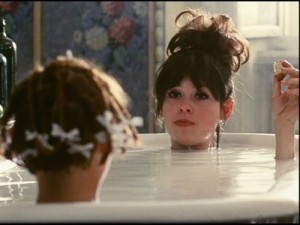Blu-ray & DVD Release Date: April 24, 2012
Price: DVD $69.99
Studio: Criterion
Of all the cinematic New Waves that broke over the world in the 1960s, the one in Czechoslovakia was among the most fascinating and radical, as can be seen in the five feature-length films and five shorts found in Criterion’s Eclipse Series 32: Pearls of the Czech New Wave.
With a wicked sense of humor and a healthy streak of surrealism, a group of directors in Czechoslovakia —including future Oscar winners Miloš Forman (One Flew Over the Cuckoo’s Nest) and Ján Kadár (The Shop on Main Street)—began to use film to speak out about the hypocrisy and absurdity of the Communist state.
The four-disc collection kicks off the 1966 omnibus film Pearls of the Deep, which introduced five of the movement’s best-known voices: Věra Chytilová, Jaromil Jireš, Jiří Menzel, Jan Němec, and Evald Schorm. Each of the filmmakers is then represented by a feature-length film.
All the movie are presented in Czech with English subtitles and feature monaural sound.
Here’s a breakdown of the films:
Pearls of the Deep (1966)
A manifesto of sorts for the Czech New Wave, this five-part anthology of shorts shows off the breadth of expression offered by the movement’s versatile directors. All based on stories by the legendary writer Bohumil Hrabal, the films range from surreally chilling to caustically observant to casually romantic, but all have a uniquely cutting view of the world.
Daisies (1966)
Perhaps the New Wave’s most anarchic entry, Věra Chytilová’s absurdist farce follows the slapstick misadventures of two brash young women who embark on a series of disorderly, prankish escapades in which nothing is sacred.
A Report on the Party and Guests (1966)
In Jan Němec’s surreal fable, the weekend countryside frolic of an ordinary group of men and women is rudely transformed into a lesson in political hierarchy when a handful of mysterious authority figures show up and begin to control their actions.
Return of the Prodigal Son (1967)
The most outspokenly political of the movement’s filmmakers, Evald Schorm offers a raw psychological drama about a socially alienated engineer unable to adjust to the world around him following a suicide attempt.
Capricious Summer (1968)
Two years after his worldwide hit Closely Watched Trains, Jiří Menzel directed this funny and reflective idyll about three middle-aged bourgeois men whose carefree summer, occupied by little more than fishing, drinking, and eating, is interrupted by the arrival of young traveling circus performers.
The Joke (1969)
Jaromil Jireš’s fragmentary adaptation of Milan Kundera’s novel jumps between the past and present to tell the Kafkaesque tale of Ludvik, a scientist who, in the 1950s, was expelled from the Communist Party when the authorities intercepted a postcard from him to his girlfriend that he’d intended as a political joke.
|
Buy or Rent Pearls of the Czech New Wave
|
|||
|---|---|---|---|
DVD |
 DVD DVD |
 DVD DVD |
|

Leave a Reply